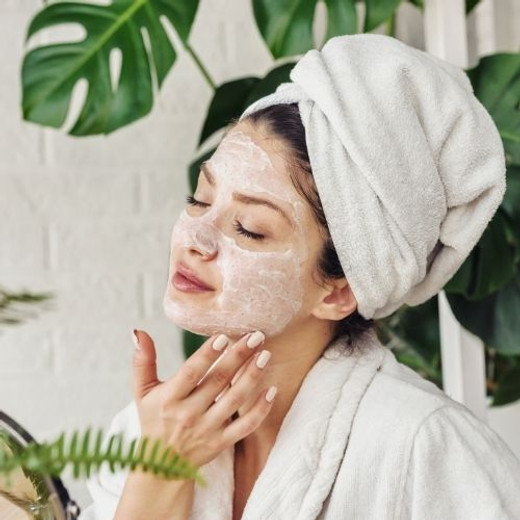5 Tips for Eco-Friendly Skin Care
Posted by Nikki Wisher on Jun 21st 2021
You’ve built your skin care routine for one reason and one reason only: so you can enjoy healthy, beautiful skin. That’s a worthy purpose, but you don’t want to make too many sacrifices along the way either, like sacrificing the health and safety of the environment. No judgment, but your skin care routine could be having more impact on the planet than you realize.
The simple truth is that most skin care products are built for our convenience and that often involves eco-unfriendly practices like harmful ingredients and gobs of plastic or other types of waste. Here’s the good news, though: there are easy changes you can make so that your skin care is kind to both your skin and the environment. Start with these top tips.
Choose Reusable When Possible
Waste of any kind can quickly add up in landfills, oceans, and more, so it’s best to avoid single-use products whenever possible. When it comes to skin care, the most common throwaway items are makeup remover wipes and cotton swabs.
Instead of makeup remover wipes, use a gentle cloth with micellar water or makeup remover solution instead. There are even reusable swabs made with silicone instead of cotton. For any reusable products like these, though, make sure you wash them thoroughly and wash them often to avoid bacteria growth.
Shop Reef-Safe
You’ve seen me write until I’m blue in the face that sunscreen is one of the most essential parts of any skin care regimen if you want to keep aging at bay, not to mention prevent skin cancer. The wrong type of sunscreen, though, contains chemicals that can harm the coral in coral reefs. This leads to a domino effect that puts a variety of animal species in danger while also putting us at a higher risk for shore erosion and certain natural disasters.
The solution? Buy reef-safe sunscreen instead. These products are just as effective as traditional sunscreens with the same SPF but they skip those coral-harming chemicals.
Reuse and Recycle
Let’s go back to the question of waste, shall we? Yes, daily single-use items are bad for the environment, but even smaller sources of waste like your empty product bottles can add up. This is especially true for plastic bottles because they take so long to break down and, in the meantime, they can leach harmful chemicals into our oceans and soil.
Instead of tossing your empties in the trash, wash them out and throw them in the recycling bin instead. Or, better yet, look for ways to reuse them for storage. You could even get crafty with them and use some spray paint and fun supplies to turn them into mini vases or other one-of-a-kind pieces.
Aim for Organic Skin Care
Opinions about organic foods are a bit all over the map, with some saying they’re essential while others say their impact on your health is exaggerated. Regardless of that debate, one thing is for sure: organic growing is generally better for the environment.
Pesticides often kill more than the specific pests they’re trying to target. The issue with this is that our ecosystems throughout the planet are very delicate balances, with species of insects, plants, and animals each playing a role in keeping the cycle of life alive. Pesticides can inadvertently disrupt those balances and lead to a waterfall of further consequences. For this reason, opt for skin care products that use organic ingredients, like the Revision Pore Purifying Clay Mask.
Look for Eco-Friendly Certifications
There are so many factors that can make a skin care product environmentally-friendly (or not), and quite frankly, it’s tough to keep track of them all and to research each brand or product you buy. That’s why some helpful organizations are doing it for us.
You’ve probably heard of cruelty-free certifications, but when it comes to maintaining eco-friendly standards, the top certification you want to look for is from the Rainforest Alliance. This international, independent non-profit organization examines products and the ways they’re developed and manufactured to determine how well they protect forestry and agriculture. If you see a Rainforest Alliance seal on the bottle, you know this product has passed the test.
Greenifying Your Skin Care
No one wakes up in the morning and says, “How can I give climate change a hand today?” or “Let’s go endanger a few species.” We all have good intentions, but we also all use products that damage our planet without our knowledge. No shade, that’s just how our world is.
The road to a healthier planet starts with digging into our daily routines and looking for ways to make them a bit eco-friendlier, one step at a time. The tips above do exactly that for your daily skin care so you can rest easier with clean skin and a cleaner conscience.

